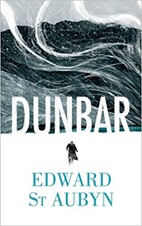
Dunbar is the third book I’ve read from the Hogarth Shakespeare Project, in which eight authors were invited to reimagine a Shakespeare play of their choosing. I loved Tracy Chevalier’s take on Othello in New Boy, as well as Hag-Seed in which Margaret Atwood gave The Tempest a new lease of life.
Dunbar is the first that I’ve read with absolutely no prior knowledge of the play upon which it’s based, however, and before reading Dunbar I couldn’t have told you a single thing about King Lear beyond its ultimately tragic nature. Whilst I was a little daunted by this and unsure as to whether I’d “get it” without knowing something about the play from which it takes its inspiration, I was relieved to find that Dunbar does work as a standalone novel with no prior knowledge needed to enjoy it, although I do wonder at the subtleties I might have missed within its pages.
Henry Dunbar, the all-powerful head of a global media corporation, is a man who is used to getting what he wants, and so the refusal of Florence, his youngest daughter, to become involved in the family business leaves him seething, and he reacts vindictively, cutting her and her children out of his will and leaving everything to his two older daughters, Megan and Abby. Whilst Florence accepts this (thereby robbing Henry of the satisfaction of any sort of reaction), Megan and Abby decide that they want more, and stage a coup to take Henry out of the picture, removing him to a small nursing home in the Lake District.
As Megan and Abby manoeuvre the board towards a vote of no confidence in Henry, which would remove him from the company permanently, Henry escapes from the nursing home, and now Florence has to find him before Megan and Abby do.
Dunbar is filled with a cast of largely unlikeable characters. Megan and Abby are selfish and almost Machiavellian in their betrayal of their father, although it seemed to me that it was a case of the apple not falling far from the tree. To become the head of a global corporation takes some degree of ruthlessness, I think, and he’s showed his own malicious nature in his treatment of Florence, however much he regrets it once Megan and Abby have started to remove him from power. I did feel some sympathy towards Henry, however, although this was perhaps driven by a desire for the lesser of two evils to emerge victorious.
I thought that the characters of Megan and Abby were perhaps a little over-exaggerated, so much so that I struggled to take them seriously at times. They seemed quite one-dimensional and I didn’t get much of a sense of a personality from either of them. I also wasn’t sure of their motives for seeking to displace their father, other than their obvious greed, and I would have a like a little more exploration of why they were going to such lengths to take over their father’s business.
Henry’s escape from Meadowmeade allows him time to reflect upon past transgressions, and in particular his treatment of Florence, and I enjoyed the change in his world view as he comes to appreciate the strength of character it would take to be honest and to tell him that she has no interest in his legacy. To say that I enjoyed the scenes where Henry is lost on the moors isn’t quite right, but I thought that setting him adrift from everything to allow him to reflect upon his life in this way was brilliantly done, and I did hope that Florence would find him first to allow him his chance at redemption.
At approximately 210 pages, Dunbar is a short novel, and the pace is relatively slow as Henry, with varying degrees of lucidity, has time to think about what’s he done and how he’s got to where he is now. I did have a couple of unanswered questions by the end of the novel, and I didn’t (in my naivety of the original play) expect it to end quite as it did, although I wasn’t expecting a happy ending, given the nature of the play.
Rating: ⭐ ⭐ ⭐ ⭐
I hadn’t even heard of the Hogarth Shakespeare Project, though I had heard of Hag-Seed, I absolutely need to read these books. This sounds amazing, thanks for your great review!
Thank you for your kind words, Jordanne – I hope you enjoy these adaptations as much as I have! 🙂